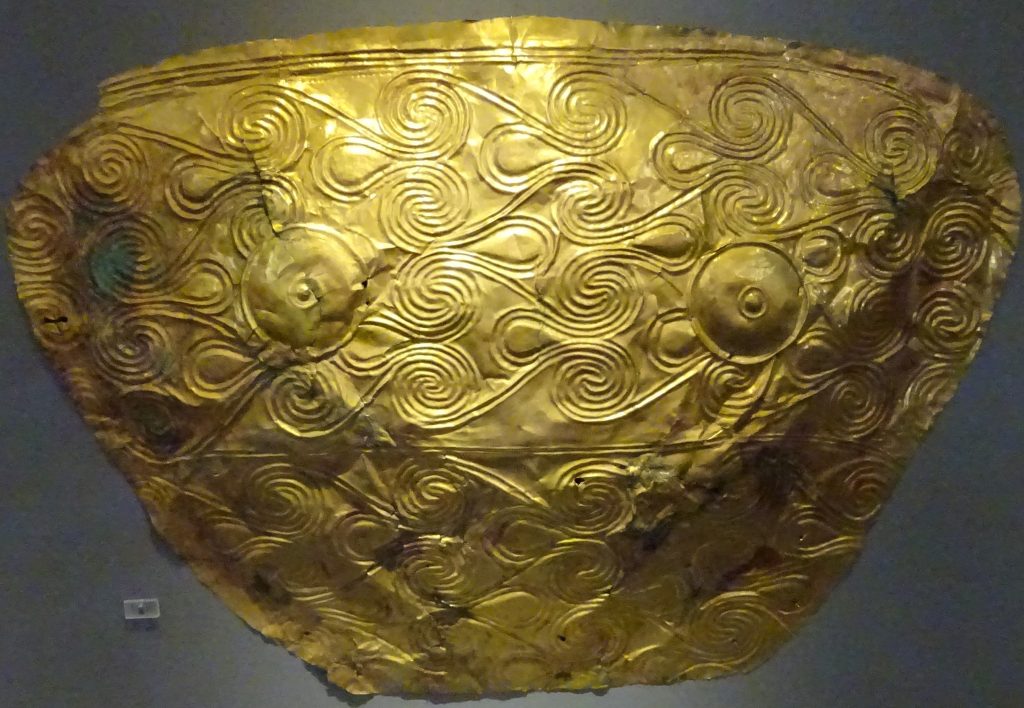
When we see the golden artefacts found in the Grave Circles A and B at Mycenae and the so-called “treasure of Priam,” it shows an incredible abundance of gold, silver and bronze in the Mycenaean period. Even in Homeric poetry we have the mention of “Mycenae rich in gold” [polúkhrusos][1], and there are references various metals in Homeric and Hesiodic poetry: silver, gold, iron, along with copper and its alloy bronze.
So we wanted to know more about how these metals were mined.
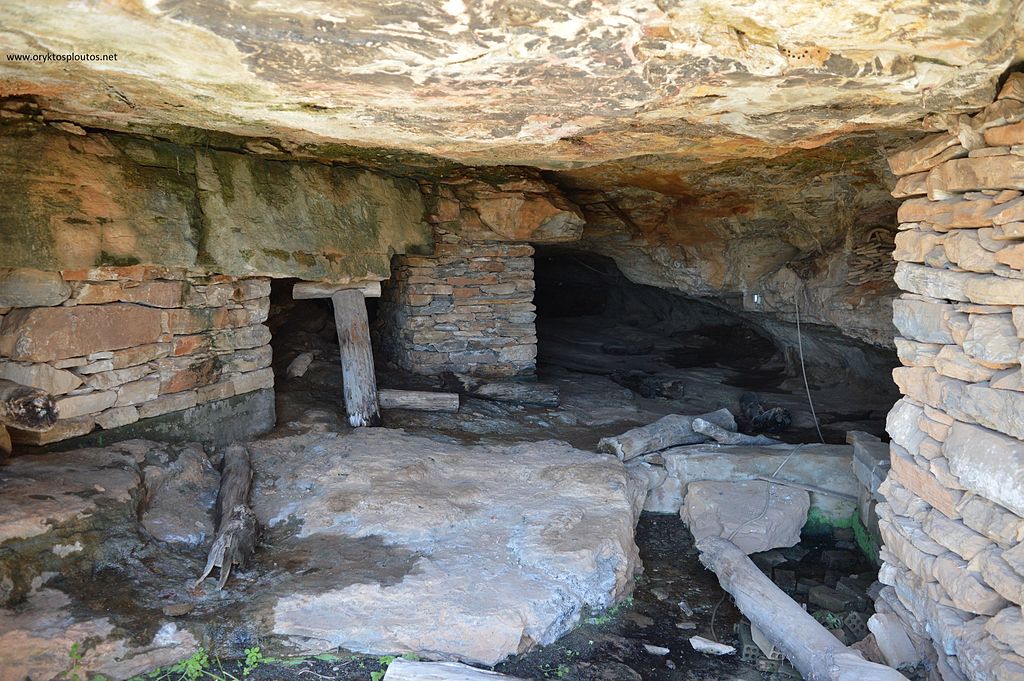
This encyclopedia entry provides a historical summary of mining:
Mining began in the Mesolithic period. It began around 3000 BCE in Bronze Age urban cultures from Crete to China, and it spread to smaller scale village settings of the Bronze Age in Europe and Asia in the second millennium BCE. During this phase, people were mining copper, tin, silver, and gold. Mining iron ore began in the Iron Age (starting around 1200 BCE) all over the Ancient World, beginning with the Hittites, the Indoeuropeans, the Phoenicians, the Illyrians, and the Etruscans. Solomon in Israel started mining copper in the Gulf of Aqaba with help from the Phoenicians, and the Greeks started doing it a bit later in Cyprus, along with gold mining in Thasos and probably iron ore mining in Tainaron in Laconia. Archilochus the poet, who spent time in Thasos, attests to a goldrush in the area, including the coast across from it and Macedonia in the 7th Century BCE. The mining of silver in Laurie in Attica began in the 6th Century BCE, during the time of the Peisistratids, when the silver funded their army as it did a bit later the building of the fleet by Themistocles and the Athenian Empire of the 5th Century BCE along with the Athenian war party’s efforts led by Demosthenes against Philip II. The Laurium mine was so important to the different political regimes that took advantage of it that it generated technological innovation in mining, such as ventilation, lighting, water management along with innovations in smelting techniques. The work was largely done by slaves, though it was not forbidden that free people to engage in it. The price of silver increased over time along with the value of slaves who were competent in the process. Outside of the Laurium mine, the sources are scanty and fragmentary.
Adapted from Lexikon der Antike[2]
However, we do not know for certain how gold was processed during the Bronze Age period. Northern Greece was certainly a place rich in gold, and Strabo mentions some mines in Phrygia and in Thrace among other places.
… the wealth [ploutos] of Tantalus and the Pelopidae was derived, it is said, from the mines [metallon] about Phrygia and Sipylus; that of Cadmus from those around Thrace and Mount Pangaeum; that of Priam from the gold mines [khruseion]at Astyra near Abydus (of which at present there are small remains; yet there is a large quantity of matter ejected, and the excavations [orugma] are proofs [sēma] of former workings [metalleia]); that of Midas from those about Mount Bermium; that of Gyges and Alyattes and Croesus from those of Lydia and the small deserted city between Atarneus and Pergamum, where are the sites of exhausted mines [ek-metalleuein].
Strabo Geography 14.5.28, adapted from translation by Hamilton & Falconer[3]
Minerals, especially precious or useful metals, were sought after. Strabo also gives an account of the rich sources in the Iberian peninsula, and the method of extracting and processing the metals:
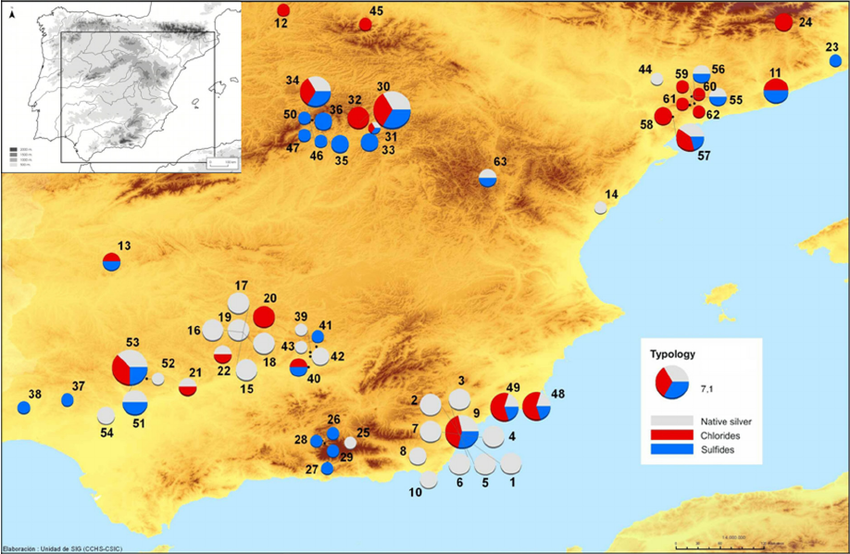
Of the various riches of the aforenamed country [=Turdetania], not the least is its wealth in metals [metalleia]: this every one will particularly esteem and admire. Of metals, in fact, the whole country of the Iberians is full, although it is not equally fertile [eukarpos] and flourishing [eudaimōn] throughout, especially in those parts where the metals [metallon] most abound. It is seldom that any place is blessed with both these advantages, and likewise seldom that the different kinds of metals [metallon] abound in one small territory. Turdetania, however, and the surrounding districts surpass so entirely in this respect, that however you may wish, words cannot convey their excellence. Gold [khrusos], silver [arguros], copper [khalkos], and iron [sidēros], equal in amount and of similar quality, not having been hitherto discovered in any other part of the world. Gold [khrusos] is not only dug from the mines [metalleuein], but likewise collected; sand containing gold [khrusitēs] being washed down by the rivers and torrents. It is frequently met with in arid districts, but here the gold [khrusos] is not visible to the sight, whereas in those which are overflowed the grains [psēgma] of gold [khrusos] are seen glittering. On this account they cause water to flow over the arid places in order to make the grains [psêgma] shine; they also dig [orussein] pits [phrear], and make use of other contrivances for washing the sand, and separating the gold [khrusos] from it; so that at the present day more gold is procured by washing [khrusoplusion] than by digging it from the mines [khrusōrukheion]. The Galatæ affirm that the mines [metallon] along the Kemmenus mountains and their side of the Pyrenees are superior; but most people prefer those on this side. They say that sometimes amongst the grains [psēgma] of gold [khruseos] lumps have been found weighing half a pound, these they call palœ; they need but little refining [katharsis]. They also say that in splitting open stones [lithos] they find small lumps, resembling paps. And that when they have melted [epsein] the gold [khrusos], and purified [kathairein] it by means of a kind of aluminous earth, the residue left is electrum [ēlektron]. This, which contains a mixture of silver [arguros] and gold [khrusos], being again subjected to the fire [kathepsein], the silver [arguros] is separated and the gold [khrusos] left [pure]; for this metal is easily dissipated and fat, and on this account gold [khrusos] is most easily melted [tēkein] by straw, the flame of which is soft, and bearing a similarity [to the gold], causes it easily to dissolve [diakheîn]: whereas coal [anthrax], besides wasting a great deal, melts it too much [huper-tēkein] by reason of its vehemence, and carries it off [in vapour]. In the beds of the rivers the sand is either collected and washed [plunein] in boats close by, or else a pit [phrear] is dug [orussein] to which the earth is carried and there washed [plunein]. The furnaces [kaminos] for silver [arguros] are constructed lofty, in order that the vapour [lignus], which is dense and pestilent, may be raised and carried off. Certain of the copper mines [khalkourgeîon] are called gold mines [khruseîon], which would seem to show that formerly gold [khrusos] was dug [oruttein] from them.
Strabo Geography 3.2.8, adapted from translation by Hamilton & Falconer[4]
He also refers to the account of Posidonius, which refers to some of the trading routes:
He says that tin [kattiteros] is not found upon the surface, as authors commonly relate, but that it is dug up [oruttein]; and that it is produced both in places among the barbarians who dwell beyond the Lusitanians and in the islands Cassiterides; and that from the Britannic Islands it is carried to Marseilles. Amongst the Artabri, who are the last of the Lusitanians towards the north and west, he tells us that the earth is powdered with silver [arguros], tin [kattiteros], and white gold [khrusos], that is, mixed with silver [arguro-migēs], the earth having been brought down by the rivers: this the women scrape up [diamân] with spades, and wash [plunein] in sieves, woven after the fashion of baskets. Such is the substance of what [Posidonius] tells us concerning the mines [metallon] [of Iberia].
Strabo Geography 3.2.9, adapted from translation by Hamilton & Falconer[5]
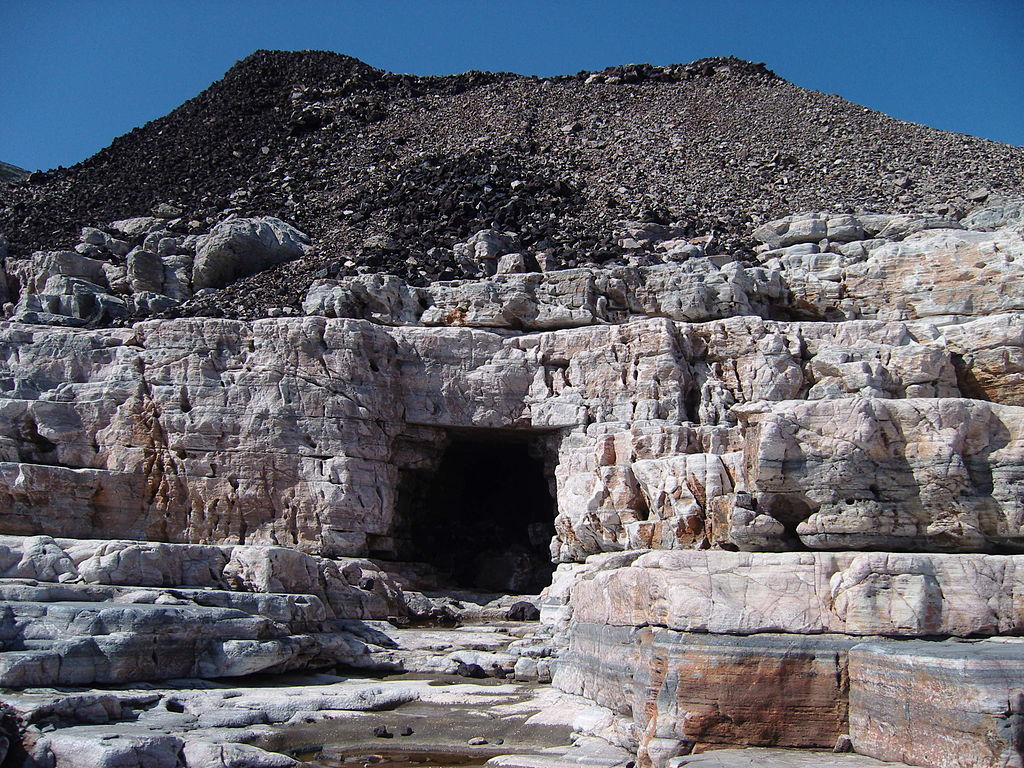
From Herodotus we hear about the island of Siphnos in the Cyclades as a source of gold and silver:
the Samians who had brought an army against Polycrates sailed away too, and went to Siphnus; [2] for they were in need of money [khrēmata]; and the Siphnians were at this time very prosperous and the richest [plouteîn] of the islanders, because of the gold [khruseos] and silver [argureos] mines [metallon] on the island. They were so wealthy that the treasure [thesauros] dedicated by them at Delphi, which is as rich [plousios] as any there, was made from a tenth of their income [khrēmata]; and they divided among themselves each year’s income [khrēmata].
Herodotus The Histories 3.57, adapted from translation by Godley[6]
However, things did not end well for them. Pausanias tells us that at Delphi:
The Siphnians too made a treasury [thesauros], the reason being as follows. Their island contained gold [khrusos] mines [metallon], and the god ordered them to pay a tithe of the revenues to Delphi. So they built the treasury [thesauros], and continued to pay the tithe until greed [aplēstíā] made them omit the tribute, when the sea flooded their mines [metallon] and hid them from sight.
Pausanias Description of Greece 10.11.2, adapted from translation by Jones[7]
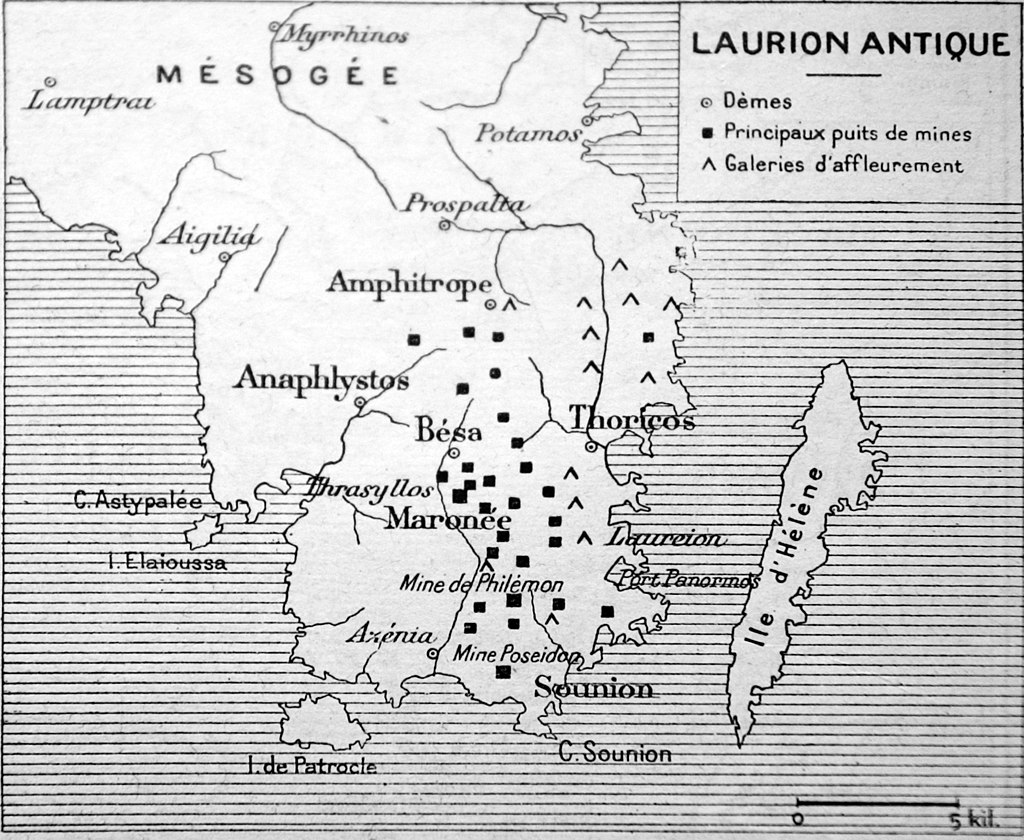
Other islands also had mines. Pausanias mentions:
On the Greek mainland facing the Cyclades Islands and the Aegean Sea the Sunium promontory stands out from the Attic land. When you have rounded the promontory you see a harbor and a temple to Athena of Sunium on the peak of the promontory. Farther on is Laurium, where once the Athenians had silver mines
Pausanias Description of Greece 1.1.1, adapted from translation by Jones[8]
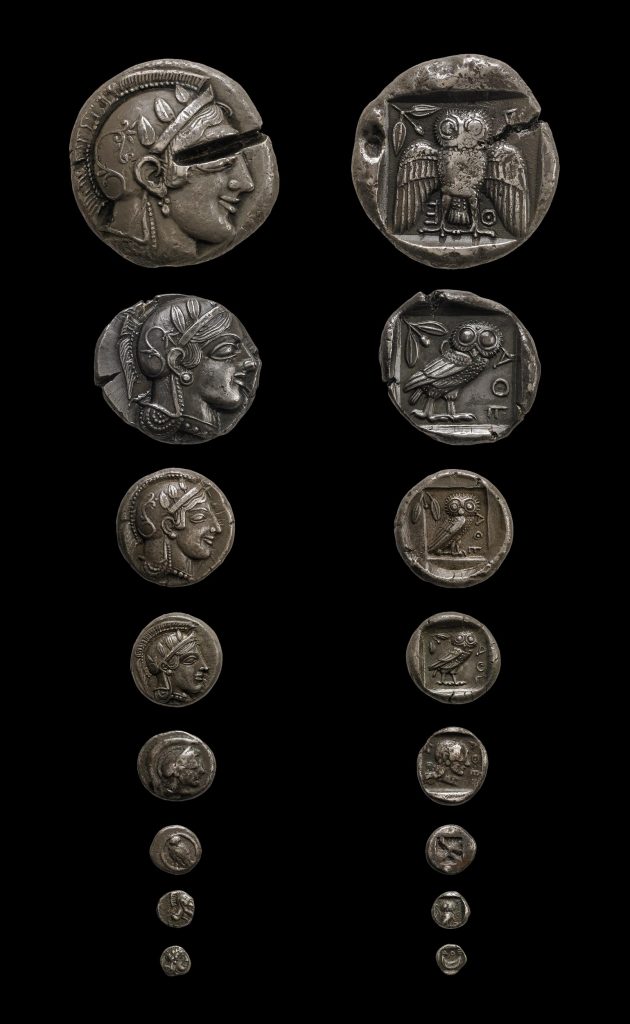
Silver from Laurion, as mentioned in the encyclopedia quote above, was used to fund Athens’ defensive fleet in the war against Aegina and against Xerxes at Salamis (484–483 and 480 BCE, according to Perrin’s footnotes to the following passage):
whereas the Athenians were wont to divide up among themselves the revenue [prosodos] coming from the silver [argureos] mines [metallon] at Laureium, he [= Themistocles], and he alone, dared to come before the people with a motion that this division be given up, and that with these moneys [khrēmata] triremes be constructed for the war against Aegina. This was the fiercest war then troubling Hellas, and the islanders controlled the sea, owing to the number of their ships. [2] Wherefore all the more easily did Themistocles carry his point, not by trying to terrify the citizens with dreadful pictures of Darius or the Persians—these were too far away and inspired no very serious fear of their coming, but by making opportune use of the bitter jealousy which they cherished toward Aegina in order to secure the armament he desired. The result was that with those moneys [khrēmata] they built a hundred triremes, with which they actually fought at Salamis against Xerxes.
Plutarch: Themistocles 4, adapted from translation by Bernadotte Perrin[9]
It would not necessarily have been the miners themselves who benefited from producing mineral resources. Demosthenes refers to owning mines, and the owners would no doubt have had income or wealth from this source:
in connection with my father I borrowed twenty minae from Blepaeus the banker, for the purchase of some mining [metallon] properties, and after my father’s death I shared the mines [metallon] with these men, but had to pay the loan myself.
Demosthenes Against Boeotus 2:40.52, adapted from translation by Murray[10]
And from Xenophon we hear about how profitable it can be to be a mine owner, and proposes ways of making them more profitable:
As for the silver [argureios] mines, I believe that if a proper system of working were introduced, a vast amount of money [khrēmata] would be obtained from them apart from our other sources of revenue [prósodos]. I want to point out the possibilities of these [mines] to those who do not know. For, once you realize their possibilities, you will be in a better position to consider how they [= the mines] should be managed.
[2] Now, we all agree that they = the mines] have been worked for many generations. At any rate, no one even attempts to date the beginning of [mining] operations. And yet, although digging [oruttein] and the removal of the silver ore [argurîtis] have been carried on for so long a time, note how small is the size of the dumps compared with the virgin and silver-laden [huparguros] hills. [3] And it is continually being found that, so far from shrinking, the silver-yielding [argurōdēs] area extends further and further.
Well, so long as the maximum number of workmen was employed in them, no one ever wanted a job; in fact, there were always more jobs than the labourers could deal with. [4] And even at the present day no owner of slaves employed in the mines [metallon] reduces the number of his men; on the contrary, every master obtains as many more as he can. The fact is, I imagine, that when there are few diggers [oruttein] and searchers, the amount of metal [khrēmata] recovered is small, and when there are many, the total of ore [argurîtis] discovered is multiplied. Hence of all the industries with which I am acquainted this is the only one in which expansion of business excites no jealousy.
…
[25]…During the history of the mines [argureios] an infinite number of men has worked in them; and yet the condition of the mines [argureios] to-day is exactly the same as it was in the time of our ancestors, and their memory ran not to the contrary. [26] And present conditions all lead to the conclusion that the number of slaves employed there can never be greater than the works need. For the miners [oruttein] find no limit to shaft or gallery [huponomos]. [27] And, mark you, it is as possible now to open new veins [kainotomeîn] as in former times. Nor can one say with any certainty whether the ore [argurîtis] is more plentiful in the area already under work or in the unexplored tracts [atmētos].
[28]Then why, it may be asked, are fewer new cuttings [kainotomeîn] made nowadays than formerly? Simply because those interested in the mines [metallon] are poorer. For operations have only lately been resumed, and a man who makes a new cutting [kainotomeîn] incurs a serious risk. [29] If he strikes good stuff he makes a fortune; but if he is disappointed, he loses the money he has spent. Therefore people nowadays are very chary of taking such a risk.
Xenophon Ways and Means 4, adapted from translation by Marchant & Bowersock[11]
Xenophon concentrates on the profit for the mine-owners, and simply takes it for granted that it would be slaves carrying out the work.
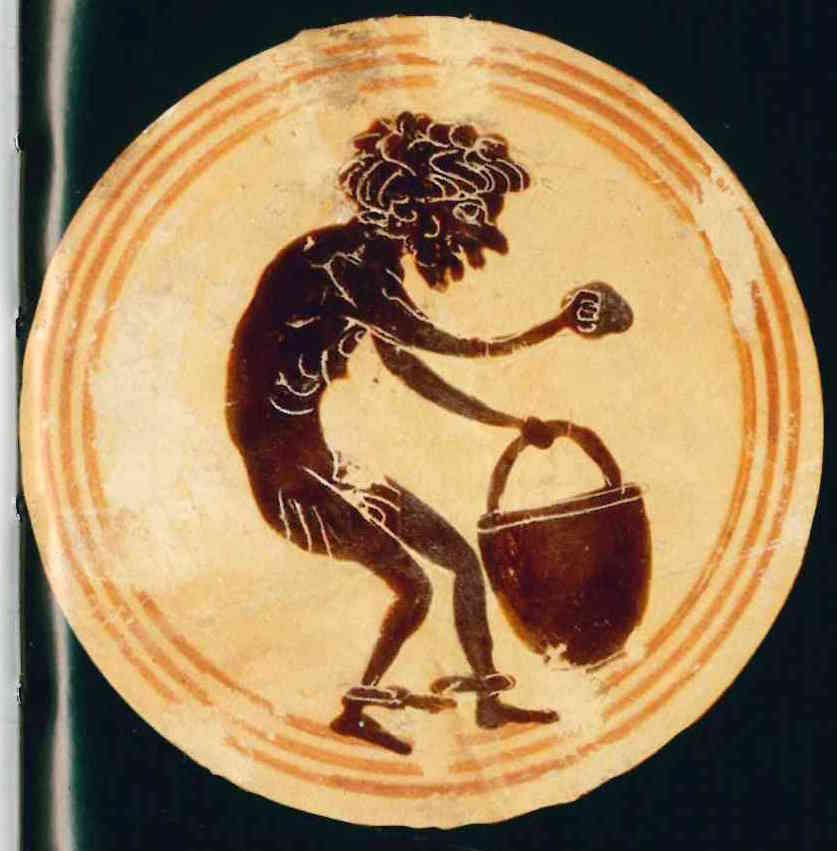
Cartledge (2011)12, writing about the mines at Laurion and the slaves, says that at the end of the Peloponnesian war (413–404BCE), because the Spartans occupied part of Attica, investors stopped the working in the Laurion silver-mines, and more than 20000 slaves fled, most of whom were skilled in mining and agriculture. Unhappily for them, these slaves were captured and sold by Spartans to Thebes, who got benefits by buying cheap thousands of runaway slaves from the Athenian silver-mines.
From the original sources we hear a little about how grueling the work was, when the (unnamed!) wife of Pythes who tried to make her husband see reason about his obsession with gold, albeit with limited success:
It is reported that the wife of Pythes, who lived at the time of Xerxes, was a wise and courteous woman. Pythes, as it seems, finding by chance some gold [khruseos] mines [metallon], and falling vastly in love with the riches [ploutos] got out of them, was insatiably and beyond measure exercised about them; and he brought down likewise the citizens, all of whom alike he compelled to dig [oruttein] or carry or refine [kathairein] the gold [khrusion], doing nothing else; many of them dying in the work, and all being quite worn out. Their wives laid down their petition at his gate, addressing themselves to the wife of Pythes. She bade them all depart and be of good cheer; but those goldsmiths [=craftsmen of gold, khrusion] which she confided most in she required to wait upon her, and confining them commanded them to make up golden [khruseos] loaves, all sorts of junkets and summer-fruits, all sorts of fish and flesh meats, in which she knew Pythes was most delighted. All things being provided, Pythes coming home then (for he happened to go a long journey) and asking for his supper, his wife set a golden [khruseos] table before him, having [p. 383] no edible food upon it, but all golden [khruseos]. Pythes admired the workmanship for its imitation of nature. When, however, he had sufficiently fed his eyes, he called in earnest for something to eat; but his wife, when he asked for any sort, brought it of gold [khruseos]. Whereupon being provoked, he cried out, “I am hungry.” She replied: “You have made none other provisions for us; every skilful science and art being laid aside, no man works in husbandry; but neglecting sowing, planting, and tilling the ground, we delve [orussein] and search for useless things, killing ourselves and our subjects.” These things moved Pythes, but not so as to give over all his works about the mine [metallon]; for he now commanded a fifth part of the citizens to that work, the rest he converted to husbandry and manufactures.
Plutarch Mulierum virtutes 27, adapted from translation by Goodwin[13]
Again, however, although there might have been more food available for everyone, the workers have no choice about what sort of work they do.
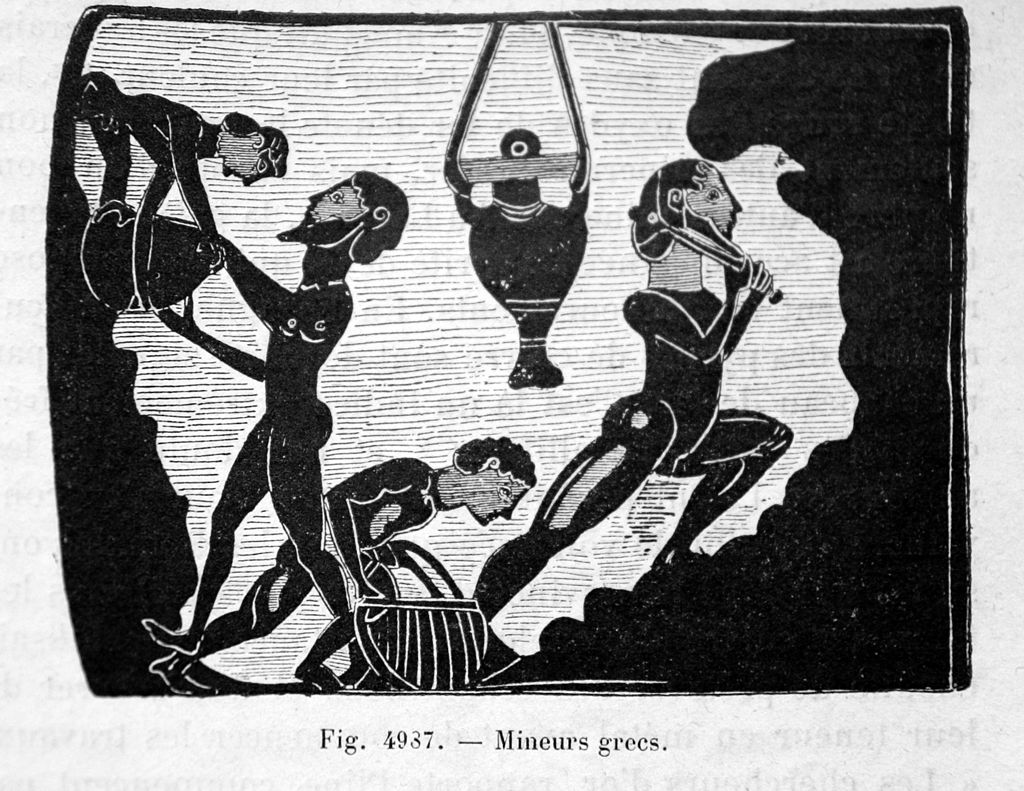
However, there is evidence that at times slaves themselves did try to take matters into their own hands.
Laurentius rose up and said,—But each of the Romans (and this is a fact with which you are well acquainted, my friend Masyrius) had a great many slaves [oiketēs]. For many of them had ten thousand or twenty thousand, or even a greater number, not for the purposes of income [prosodos], as the rich Nicias had among the Greeks; but the greater part of the Romans when they go forth have a large retinue [of slaves] accompanying them. And out of the myriads of Attic slaves [oiketēs], the greater part worked in the mines [metallon], being kept in chains: at all events Posidonius, whom you are often quoting, the philosopher I mean, says that once they revolted and put to death the guards of the mines [metallon]; and that they seized on the Acropolis on Sunium, and that for a very long time they ravaged Attica.
Athenaeus The Deipnosophists 6.104, adapted from translation by Yonge[14]
We have mainly looked in ancient sources for references to mines and mining, and the passages in this post are not exhaustive. And we are still left with questions about conditions in which the miners—mainly slaves—lived and worked. We invite members to share in the Forum any other passages they come across that refer to the extraction and processing of metals in ancient Greece or in other countries with which ancient Greeks traded or about which they wrote.
Related posts
Selected vocabulary
ánthrax [ἄνθραξ] charcoal, coal
aplēstíā [ἀπληστία] insatiate desire, greediness
argúreos, argúreios [ἀργύρεος, ἀργύρειος] adj. silver, of silver
argurîtis [ἀργυρῖτις] silver-ore
argurōdēs [ἀργυρώδης] adj. rich in silver
árguros [ἄργυρος] silver
atmētos [ἄτμητος] adj. not cut, unreaped; in mining: as yet unopened
diakheîn [διαχεῖν] to dissolve
diamân [διαμᾶν] to cut through, scrape or clear away
ēlektron [ἤλεκτρον] electrum/electron = an alloy of gold and silver [the word is also used for amber]
épsein [ἕψειν] to boil, seethe; smelt, refine
hupárguros [ὑπάργυρος] adj. having silver underneat, containing silver
hupónomos [ὑπόνομος] underground passage, mine, vein of minerals
kainotomeîn [καινοτομεῖν] to cut fresh into, in mining: to open a new vein
káminos [κάμινος] oven, furnace, kiln
kassíteros, kattíteros [κασσίτερος, καττίτερος] tin
kathaírein [καθαίρειν] to cleanse, purify
kátharsis [κάθαρσις] cleansing, purification
kathépsein [καθέψειν] to boil down
khalkós [χαλκός] copper; bronze
khalkourgeîon [χαλκουργεῖον] copper-mine
khrēmata (plural) [χρήματα] money, goods
khruseîon [χρυσεῖον] gold-mine
khrúseos [χρύσεος] adj. golden, of gold
khrusítēs [χρυσίτης] adj.: containing gold, noun: gold-dust, ore
khrusōrukheîon [χρυσωρυχεῖον] gold-mine
khrusoplúsion [χρυσοπλύσιον] gold-wash, placer, where gold is washed from the river
khrusós [χρυσός] gold
lignús [λιγνύς] thick smoke mixed with flame, smoke
líthos [λίθος] stone
metalleía [μεταλλεία] a searching for metals, mining
metalleúein [μεταλλεύειν] to get by mining, to mine
métallon [μέταλλον] mine, quarry
oikétēs [οἰκέτης] house-slave, menial
orússein, orúttein [ὀρύσσειν, ὀρύττειν] to dig
órugma [ὄρυγμα] trench, ditch, moat, tunnel, mine, excavation
phréar [φρέαρ] artificial well, tank, cistern, reservoir
ploúsios [πλούσιος] adj. wealthy, opulent
plouteîn [πλουτεῖν] to be rich, wealthy
ploûtos [πλοῦτος] wealth
plúnein [πλύνειν] to wash, clean
polúkhrusos [πολύχρυσος] adj. rich in gold
prósodos [πρόσοδος] income, revenue, returns
psêgma [ψῆγμα] savings, scrapings, gold dust
sídēros [σίδηρος] iron
tēkein [τήκειν] to melt, melt down, dissolve
thēsauros [θησαυρός] store, treasure; treasury
záploutos [ζάπλουτος] adj. very rich
Notes
1 Mycenae is referred to with this epithet in Iliad 7.180, 11.46, and Odyssey 3.305.
Greek texts: Iliad: Homer. Homeri Opera in five volumes. Oxford, Oxford University Press. 1920.
Available on Perseus
Odyssey: Homer. The Odyssey with an English Translation by A.T. Murray, PH.D. in two volumes. Cambridge, MA., Harvard University Press; London, William Heinemann, Ltd. 1919.
Available on Perseus
2 Adapted from K. Zeigler and W. Sontheimer, eds., _Der Kleine Pauly: Lexikon der Antike_, Stuttgart, 1964, s.v. Bergbau, pp. 8657=868.
3 Strabo Geography: English text: The Geography of Strabo. H.C. Hamilton, Esq., W. Falconer, Literally translated, with notes, in three volumes. London. George Bell & Sons. 1903. Available on Perseus
Greek text: Strabo. ed. A. Meineke, Geographica. Leipzig: Teubner. 1877.
Available on Perseus
6 English and Greek texts: Herodotus, with an English translation by A. D. Godley. Cambridge. Harvard University Press. 1920.
Available on Perseus
7 English text: Pausanias. Pausanias Description of Greece with an English Translation by W.H.S. Jones, Litt.D., and H.A. Ormerod, M.A., in 4 Volumes. Cambridge, MA, Harvard University Press; London, William Heinemann Ltd. 1918.
Available on Perseus
Greek text: Pausanias. Pausaniae Graeciae Descriptio, 3 vols. Leipzig, Teubner. 1903.
Available on Perseus
9 English and Greek texts: Plutarch. Plutarch’s Lives. with an English Translation by. Bernadotte Perrin. Cambridge, MA. Harvard University Press. London. William Heinemann Ltd. 1914. 2.
Available on Perseus
10 English text: Demosthenes. Demosthenes with an English translation by A. T. Murray, Ph.D., LL.D. Cambridge, MA, Harvard University Press; London, William Heinemann Ltd. 1939.
Available on Perseus
Greek text: Demosthenes. Demosthenis.Orationes. ed. W. Rennie. Oxonii. E Typographeo Clarendoniano. 1921.
Available on Perseus
11 English text: Xenophon. Xenophon in Seven Volumes, 7. E. C. Marchant, G. W. Bowersock, tr. Constitution of the Athenians. Harvard University Press, Cambridge, MA; William Heinemann, Ltd., London. 1925.
Available on Perseus
Greek text: Xenophon. Xenophontis opera omnia, vol. 5. Oxford, Clarendon Press. 1920 (repr.1969).
Available on Perseus
12 Cartledge, Paul. 2011 Ancient Greece: A Very Short Introduction Oxford University Press. Summarized from E-Book pages 308 and 370.
13 English text: Plutarch. Plutarch’s Morals. Translated from the Greek by several hands. Corrected and revised by. William W. Goodwin, PH. D. Boston. Little, Brown, and Company. Cambridge. Press of John Wilson and Son. 1874. 1.
Available on Perseus
Greek text: Plutarch. Moralia. Gregorius N. Bernardakis. Leipzig. Teubner. 1889. 2.
Available on Perseus
14 English text: Athenaeus. The Deipnosophists. Or Banquet Of The Learned Of Athenaeus. Translated by C. D. Yonge. London. Henry G. Bohn, York Street, Covent Garden. 1854.
Available on Perseus
Greek text: Athenaeus. Deipnosophistae. Kaibel. In Aedibus B.G. Teubneri. Lipsiae. 1887.
Available on Perseus
Texts accessed June 2022.
Image credits
Mycaenean gold, on display in the National Archaeological Museum of Athens
Photo: Kosmos Society
Mining shaft in Laurion: Ancient Mine Gallery in Lavrio Next to Ancient Thorikos Theatre. The beams supporting the gallery are modern
Photo: Dr. Peter Tzeferis, Creative Commons Attribution-Share Alike 4.0 International license, via Wikimedia Commons
Map showing the main silver ore deposits of Iberia
Figure 5 from Mercedes Murillo-Barroso et al “The silver of the South Iberian El Argar Culture: A first look at production and distribution”
July 2012 Trabajos de Prehistoria 69(2):293-309
DOI: 10.3989/tp.2012.12093
License CC BY-NC 4.0
https://www.researchgate.net/publication/260249143_The_silver_of_the_South_Iberian_El_Argar_Culture_A_first_look_at_production_and_distribution/figures
Entrance of a mine in Sifnos [Siphnos]
Photo: Phso2, Creative Commons Attribution-Share Alike 3.0 Unported license, via Wikimedia Commons
Map showing mines of Laurion
From Charles Daremberg, Edmond Saglio Dictionnaire des antiquités grecques et romaines 1877–1914.
Public domain, via Wikimedia Commons
Group of silver coins, Athens, 527BCE–430BCE, British Museum
Creative Commons Attribution-NonCommercial-ShareAlike 4.0 International (CC BY-NC-SA 4.0) license.
© The Trustees of the British Museum
Slave working in a mine, from a kylix c 490 BCE. Rijksmuseum can Oudheden
Photo: Huesca, Creative Commons Attribution-Share Alike 4.0 International license via Wikimedia Commons
Greek miners: reproduction of a terracotta plaque, from Charles Daremberg, Edmond Saglio, Dictionnaire des antiquités grecques et romaines, Hachette, 1877-1914
Public domain, via Wikimedia Commons
Note: Images have been selected from pictures that are freely available with open source or Creative Commons licenses or from photographs sent in by community members for the purpose. The images in this post are intended to suggest the subject, rather than illustrate exactly—as such, they may be from other periods, subjects, or cultures. Attributions are based where possible by those shown by museums, or on Wikimedia Commons, at the time of publication on this website.
Images accessed June 2022.
___
Hélène Emeriaud and Sarah Scott are members of Kosmos Society.